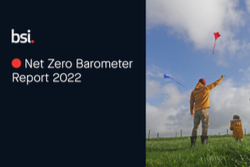 In 2021, BSI released its first ever Net Zero Barometer Report. The report provided a reading on where UK business stood in its ambitions to reduce net emissions by 100% by 2050.
In 2021, BSI released its first ever Net Zero Barometer Report. The report provided a reading on where UK business stood in its ambitions to reduce net emissions by 100% by 2050.
12 months on, we’ve released the second Net Zero Barometer Report. Once again, we surveyed 1,000 senior decision-makers at businesses all over the UK.
So, what’s changed over the last year? Where has progress been made, or resistance felt, and what do businesses need to do next to achieve net zero?
What did the 2021 report reveal?
Last year’s report uncovered some striking facts. 64% of those surveyed said that they weren’t confident they understood the implications of net zero for their organisation, making it no surprise that only 20% of small businesses had committed to a net zero target.
Ultimately, this lack of understanding led to the report concluding that it was highly unlikely most would reach the government’s net zero target by 2050.
Are we heading in the right direction in 2022?
The 2022 Report reveals that efforts to achieve net zero have gathered pace as the scale of the climate crisis looms ever larger. COP26 has also made a real difference in refocusing on the need for a collective effort to keep temperatures from rising.
Furthermore, 71% of survey respondents have already set targets for meeting net zero, and that 78% are more convinced that reaching net zero targets is possible. This marks a huge leap forward from the 2021 report, when only 40% of organisations had made a net zero commitment and a further 31% were ‘considering’ it.
The UK government and devolved administrations have also raised the bar on net zero ambitions – announcing plans to reduce emissions by 78% by 2035 compared to 1990 levels on the way to achieving existing 2050 net zero goals.
Despite the obvious challenges posed by Brexit and Covid-19, this has contributed to most survey respondents stiffening their resolve, with almost half saying that the pandemic has actually accelerated their net zero ambitious.
Priorities and knowledge gaps are slowing progress
Despite the obvious goodwill revealed by the report, barriers to achieving net zero still remain.
Perhaps the biggest obstacle is a lingering priorities gap.
BSI’s annual Net Zero Barometer Report reveals that almost half (49%) of UK senior decision makers were focused on growth in their organization versus 20% prioritizing reducing carbon emissions.
The report shows a serious gap continues to exist between net zero ambition and business priorities, with only a fifth (21%) of those polled fully aware of what net zero targets mean in practice for their organization.
Real progress relies on businesses of all sizes making carbon reduction one of their top priorities alongside growth and revenue generation. This hasn’t happened yet, though as the report makes clear, these needn’t be mutually exclusive.
Bridging the gaps and achieving net zero
This year’s Net Zero Barometer Report couldn’t be clearer in its conclusions: decision-makers recognise that net zero is essential for the ongoing resilience of their businesses, but now need to build it into the fabric of their organisations.
The report identifies the route forward, offering insights on a number of important steps:
- Build in net zero to every aspect of business – factoring in targets at every level and every aspect of strategic planning
- Seeking (and following) quality guidance – this will require an alignment of the principles of net zero and consistent information from public sector and industry bodies on how to achieve it
- Be the change by leading the change – cutting costs and cutting carbon needn’t be an either/or choice.
- Keep moving forward together – nations, governments, and individual organisations need to work together more effectively to achieve real change
To read more about how UK business is progressing on the road to net zero, download the Net Zero Barometer Report 2022 today.
To find out how to take a standards-based approach to net zero, why not visit the BSI Net Zero page for useful resources and guidance. And look out for the Net Zero Solution Pack which combines the essential standards, plus written and video guidance to get you started on your organization's journey to net zero.

 In 2021, BSI released its first ever Net Zero Barometer Report. The report provided a reading on where UK business stood in its ambitions to reduce net emissions by 100% by 2050.
In 2021, BSI released its first ever Net Zero Barometer Report. The report provided a reading on where UK business stood in its ambitions to reduce net emissions by 100% by 2050.